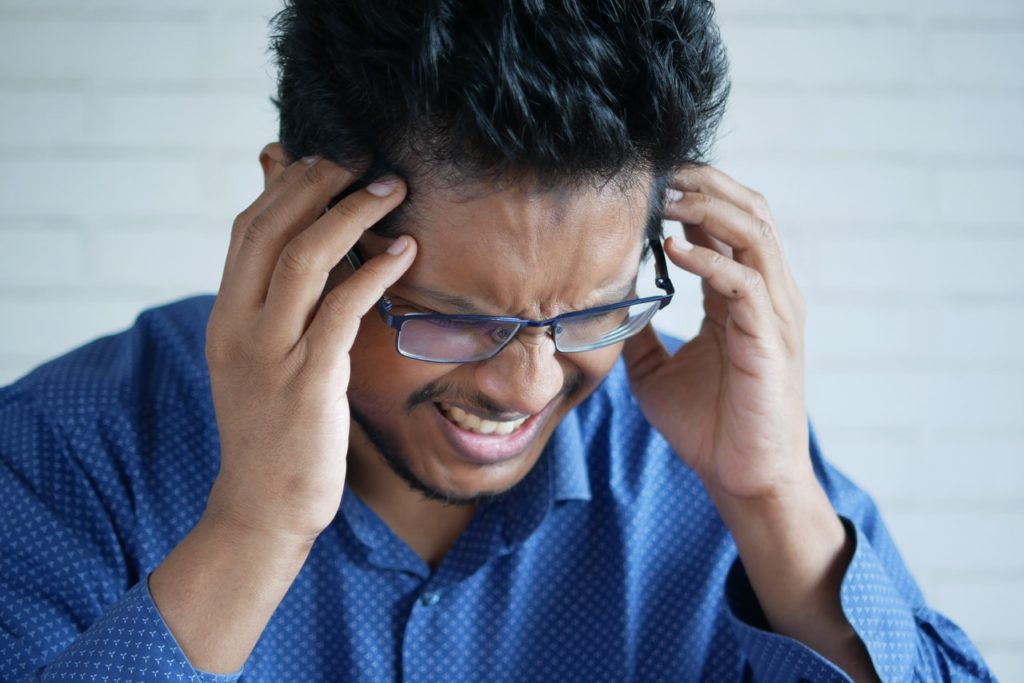
Why do we get headaches? There are many theories, but nobody actually knows.
There are 200 different types of headaches, but they are divided up into primary and secondary headaches. Primary headaches are headaches that aren’t caused by a disease or damage to the brain. Secondary headaches are caused by a disease or damage to the brain. Examples of primary headaches are cluster headaches, migraines, and tension headaches. Examples of secondary headaches are those caused by things like brain aneurysms, brain tumors, concussions, and hangovers.
The reason why we get secondary headaches is fairly straightforward. Brain tumors cause headaches because they press on nerves and blood vessels as they get larger. A brain aneurysm causes a headache for the exact same reason. When a blood vessel in the brain has a weak wall, it bulges out and makes a blood-filled balloon. This will press on nerves and other blood vessels, causing pain. When an aneurysm ruptures, the headache it produces is described as a “thunderclap” because of its severity.
So, why do we get headaches? It is more difficult to work out the causes for primary headaches and there are several different theories. One thing that is true is that the pain is not coming from within the brain. The brain is telling us that it is, but there are no pain receptors in the brain. The brain is the only organ in the body that cannot feel pain. Let’s look at two different types of primary headaches: tension, and vascular.
As the name suggests, tension headaches are caused by tension in your muscles, usually your neck, face, and scalp. Tension headaches are the most common type of headache. The pain is usually at the front of the head and feels like an elastic band is being tightened around the brain. One of the causes is the muscles in our necks and faces. When we are stressed, we tense these muscles for long periods of time. The muscles stretch up to the back of the skull, down the sides and over the front, above the eyes. When we stress these muscles, it would make sense that they would hurt. A tension headache is similar to a muscle ache in any other muscle. However, no evidence has shown that tension headaches are only caused by muscle tension. One of the theories is that the muscles send pain signals to the brain and over time, the brain alters the pain response so that it is not around the head, but within the head. Why that happens, nobody appears to know.
Vascular headaches are headaches that are caused by the swelling or dilation of blood vessels to the brain. Migraines are the most common vascular headaches. As with tension headaches, nobody knows the reason why migraines start. They could be due to swelling or a spasm in blood vessels, causing the blood flow to the brain to reduce. This brings less oxygen into certain areas of the brain. Whatever the cause, it happens in the cerebral cortex, which is the part of the brain used for attention, perception, awareness, thought, memory, language, and consciousness. The lower blood supply could change the balance of chemicals in the blood, which could cause the pain receptors in the lower head and neck to fire. There are many theories, but no one knows yet.
Out of interest (because I suffer from them), let’s have a quick look at what causes caffeine headaches. When people drink coffee every day, their body becomes dependent on it. Caffeine has many effects on our bodies, but one of them is to constrict the blood vessels around the brain. If you go without your morning cup of coffee, the blood vessels enlarge and there is an increase of blood flow around the brain. The blood vessels swell and press on nerves that surround the brain, causing the headache. When you drink that first delicious cup of coffee, the vessels constrict, and the pain goes away. For this reason, caffeine can also be a way of treating regular headaches. A hangover also causes a headache by affecting the nerves around the brain. When you drink alcohol, you dehydrate your body. When there is not enough water in the body, the blood vessels expand because their walls get weaker. When they expand, they press on nerves, causing a headache,
How do painkillers stop a headache? There are two ways. First, when you have a headache, or any kind of injury, your cells release a chemical called prostaglandins. The body’s nerves are very sensitive to prostaglandins, and this causes a pain signal to be sent to the brain. Some painkillers stop your cells from producing this chemical. The second type of painkillers work on the brain. They stop the prostaglandin being recognized in the brain, meaning the brain doesn’t sense the pain. Both types are effective, but more so on different types of pain.
So, why do we get headaches? Headaches could be caused by muscle pain, by blood vessels expanding, or by a lack of oxygen, but nobody knows for definite. And this is what I learned today.
Sources
https://www.webmd.com/migraines-headaches/migraine-aneurysm
https://training.seer.cancer.gov/anatomy/muscular/groups/head_neck.html
https://en.wikipedia.org/wiki/Tension_headache
https://www.mountsinai.org/health-library/diseases-conditions/tension-headache
https://www.mayoclinic.org/diseases-conditions/brain-aneurysm/symptoms-causes/syc-20361483
https://www.bbc.com/future/article/20140214-why-do-we-get-headaches
